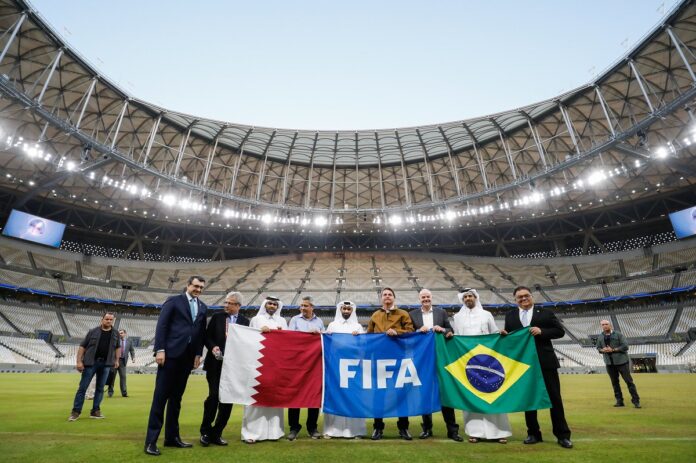In July 2018 I was studying in the United Kingdom, and paused for an afternoon to watch the England men’s national soccer team play Croatia in the FIFA World Cup semi-final. The match took place in Moscow, towards the end of a tournament hosted by Russia with much fanfare. A student in our cohort who happened to be Ukrainian, urged our group to boycott the World Cup due to Russia’s dangerous and increasingly threatening anti-Ukrainian stance.
OPINION By Ariella Scher
We laughed at her – who boycotts the soccer World Cup, the 2018 final of which attracted a combined 1.12 billion viewers worldwide (and generated an estimated $15 billion for Russia as its host)? What conceivable effect could that have? And honestly, why would we deprive ourselves of the joy brought about by our immersion in England’s jubilation at reaching a World Cup semi-final for the first time in our soccer-watching lifetimes?
While the rest of us continued to cheer on the game, our Ukrainian friend maintained her boycott, occupying herself otherwise and reminding us of Russian atrocities every time we mentioned the tournament thereafter.
Four years later, and that same Ukrainian friend is a refugee, living – like many of her family members and friends – in exile due to Putin’s criminal and ongoing invasion of Ukraine. Unfortunately, time proved her concerns right, and our jovial dismissal of her concerns look grossly insensitive (if I am to be generous).
READ MORE:
“The Workers Cup” Captures The Misery Behind The 2022 FIFA World Cup — Block
What makes this story more galling is that our cohort were all students of human rights at Masters’ level. We, perhaps more than others, ought to have known better and cared more.
This story is particularly relevant this month. What was achieved through our – global, collective – ignoring of Russian militarism and its disregard for human rights? Quite simply, we allowed Russia to engage in what’s now popularly termed ‘sportswashing’.
‘Sportswashing’ can be defined as “the practice of individuals, groups, corporations, or governments using sports to improve reputations tarnished by wrongdoing”.
We, the consumer, are the target market for such efforts. In short, sportswashing is effective only when we allow it to be so. When we disregard the state’s egregious, often criminal, disregard for human rights, and focus only on what it wants us to see – such as the fanfare of a global event – then its attempts prove effective. We allow the state to sanitise its reputation and continue to engage in friendly relations on the global stage, while erasing the victims of its policies and conduct and thereby exacerbating their vulnerability.
RELATED:
Fifa corruption scandal: the dark underbelly of the 2010 soccer World Cup
We fail our fellow humans at the expense of a few hours of guilt-free enjoyment.
The next edition of the FIFA World Cup, this time hosted by Qatar, starts later this week. There have been no shortage of reports emanating from Qatar over the past decade which tell the sorry story of a World Cup built on the literal backs and bodies of migrant workers; a long-standing and shameful refusal to recognise LGBTQI+ rights; and an environment that is not generally conducive to the protection of human rights or the provision of remedies to victims.
We dare not turn a blind eye to these significant issues.
So what, then, does a soccer fan do in these complicated circumstances – is a boycott indeed the appropriate response, and/or is it an effective stand against such well-resourced sportswashing efforts?
As a practitioner in the emerging legal arena of Business and Human Rights and a lifelong soccer fan, this question has me vexed. I don’t purport to offer a morally insurmountable answer, as I recognize that an outright boycott of the World Cup is not likely to succeed even in my own home.
But, if we take the conscious choice to enjoy the event, let’s not do so while also supporting Qatar’s attempt at sportswashing. Let’s watch the World Cup while acknowledging those whose basic freedoms have been and continue to be impacted by Qatar’s policies and conduct. Let us follow the lead of the excellent football publication Josimar in foregrounding the workers who have suffered and died to enable our enjoyment of the tournament, alongside our footballing gods.
RELATED:
Enjoy The FIFA World Cup, In Spite Of The Politics
And let’s challenge the banks and investors who have enabled Qatar to put on its dazzling show. This is not a Middle Eastern problem, and its causes and underlying funding is not limited to that region or its peoples – the Qatar World Cup is truly a global phenomenon, with global funders, globally active perpetrators and globalized victims.
If you do choose to watch this year’s Festival of Football, make sure you do so in good conscience – by not allowing Qatar’s sportswashing show to succeed. And, of course, let’s support our African friends as they take to the field!
Ariella Scher is an attorney and head of the Business and Human Rights programme at the Centre for Applied Legal Studies, University of the Witwatersrand. More significantly, in relation to the above, she is a life-long Arsenal fan.









